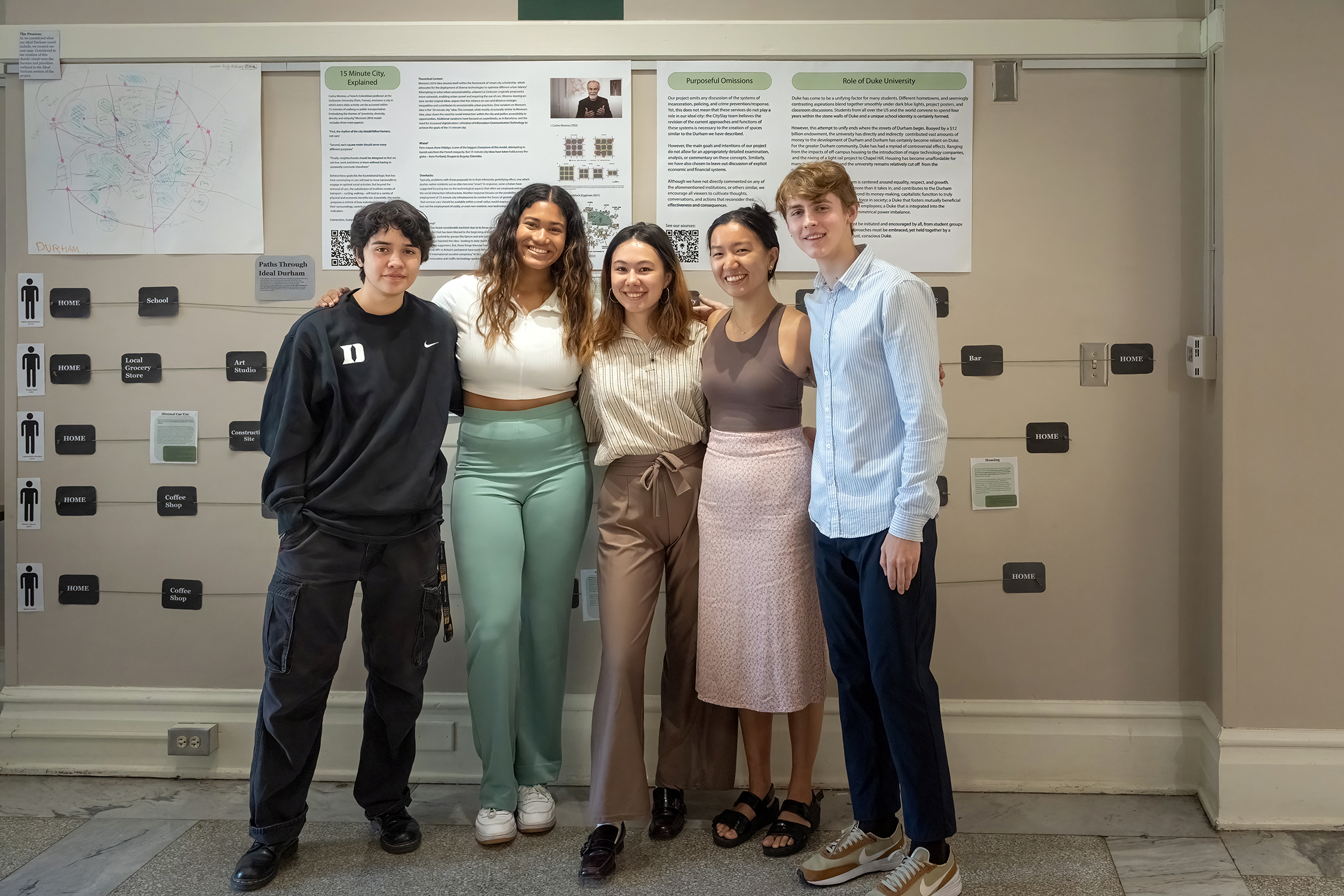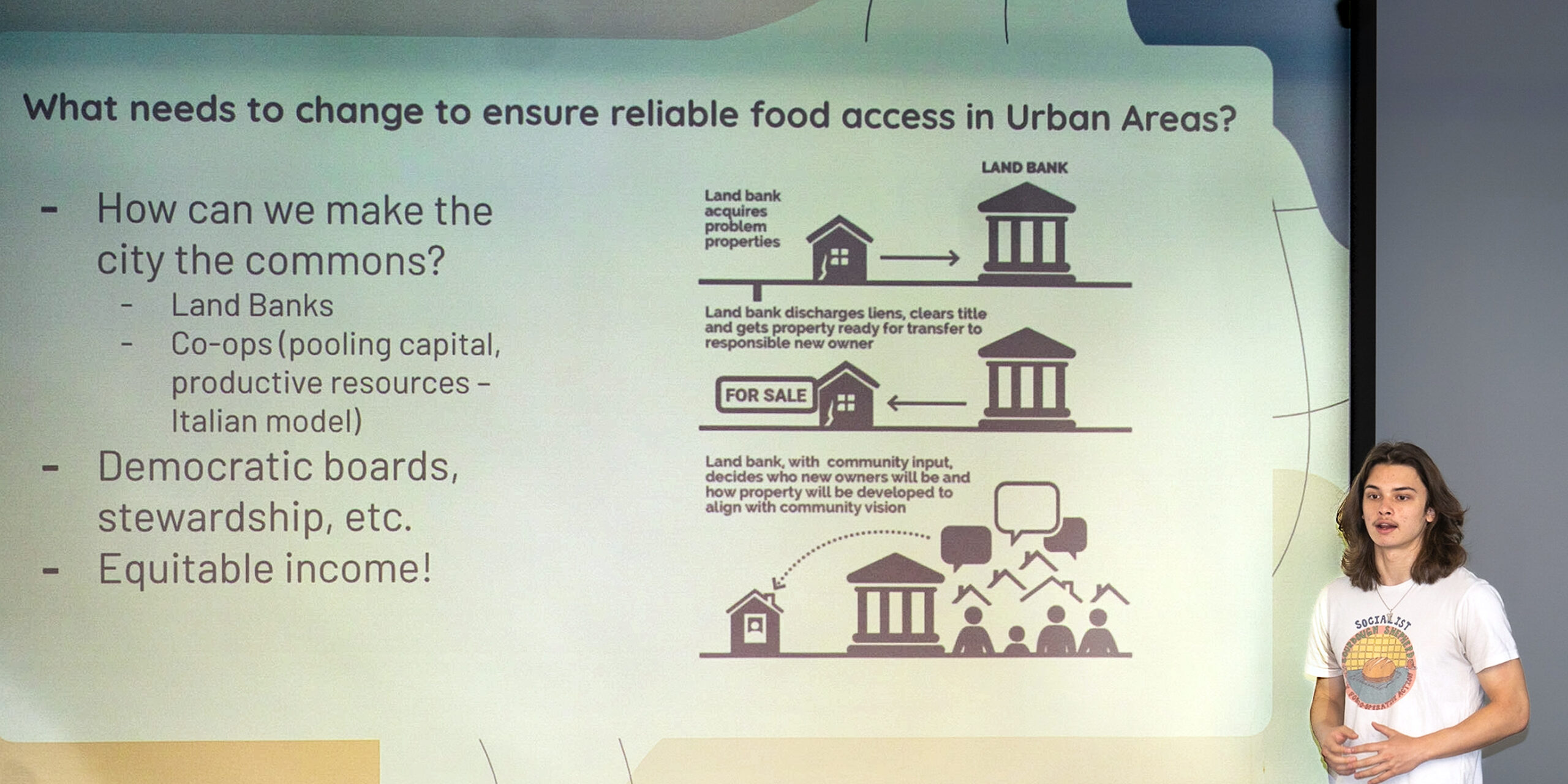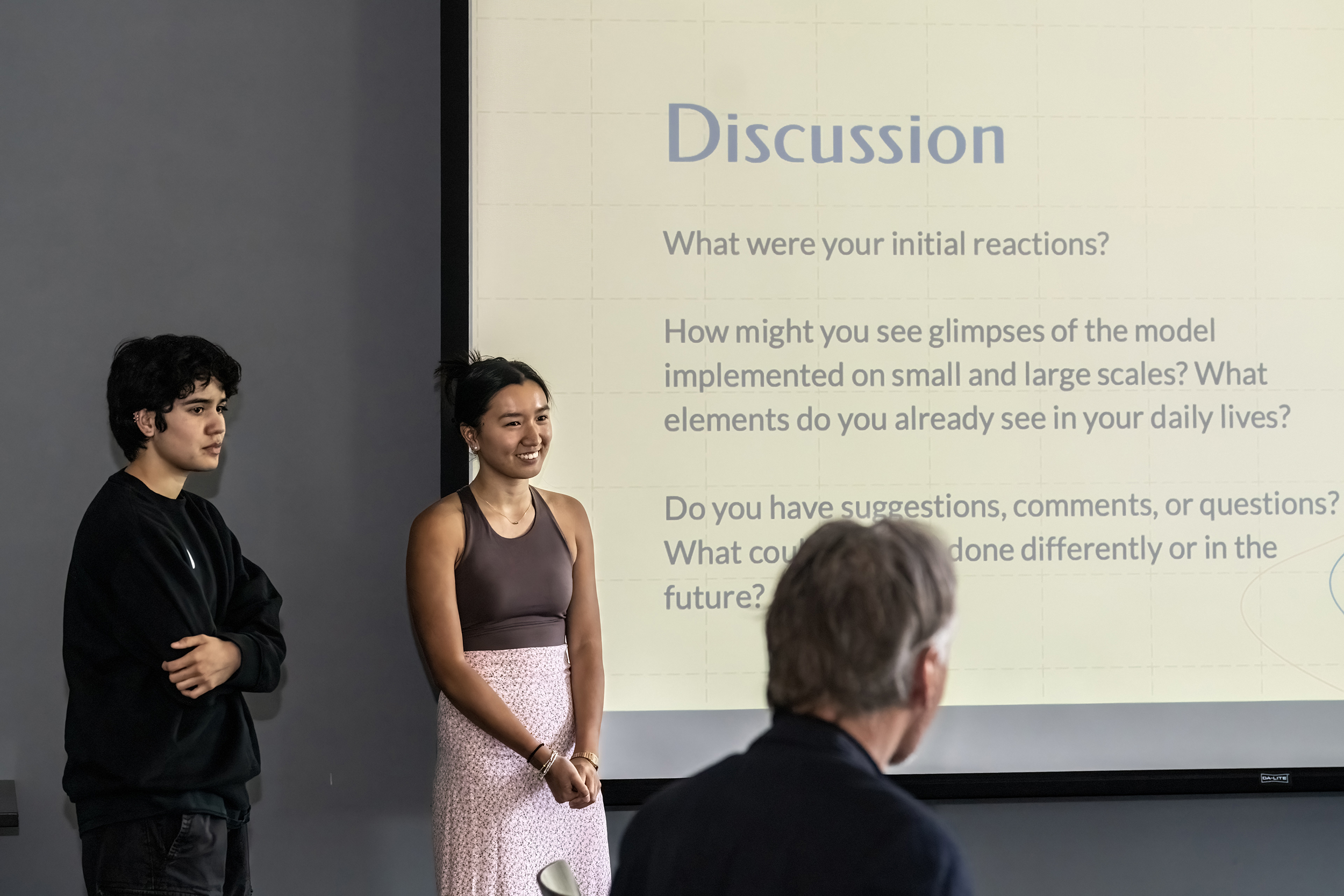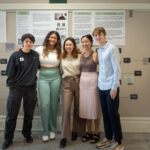Creating something new with the tools of the old does not work. Our current systems are failing us. But what might a new, better system look like?
What is rLab?
Regenerative Futures Lab (rLab) empowers young visionaries to re-imagine new, regenerative realities and serve as paradigm shifters for a more just society. rLab is the place where students collectively try to figure out how to navigate paths to a re-imagined future that prioritizes the well-being of humans and the planet. Rather than learning how to be successful in the system as it currently exists, we seek to learn how to successfully influence change towards a regenerative future; a future centered around wellbeing, reciprocity, safety, and justice.
Specifically, we will engage in tangible projects that have the potential to overcome aspects of appropriation, exploitation, toxic power, and the depletion of human spirits and natural systems. The guiding principle is engaged and responsible participation, with the aim to create something you and others can be proud of at the end of the semester, and be useful to the collective effort of building a better world. All teams will receive support from the Kenan Institute for Ethics and the director of rLab, and they will actively seek collaborations and input from experts in the field, faculty, activists, and outside organizations.
CALL FOR APPLICATIONS: “WHAT DO WE OWE TO EACH OTHER”
Applications are now open for the Spring 2025 Regenerative Futures Lab (rLab) sponsored by Kenan Institute for Ethics and the Transformative Systems Project. Each semester, rLab will provide funding for two teams of students to realize paradigm-shifting, regenerative answers to specific broader themes that will differ each year.
The theme for the 2024–2025 academic year is What Do We Owe to Each Other . The two projects currently underway are (1) Dignity for All and (2) Dying with Dignity. See project descriptions below.
DIGNITY FOR ALL
The project seeks researchers who are both big-picture thinkers and detail-oriented executors to design and realize a semester-long, cradle-to-grave project addressing the question “What is necessary to lead a life with dignity?” The goal is to collect data around this question and ideate actionable strategies to foster a world where dignity is a right, not a privilege. The team will develop a measurable project idea and deliverable that identifies the elements of a dignified life and how we, as an individual and community member, may achieve it.
DYING WITH DIGNITY
Researchers will take an ethnographic approach to explore what Duke students think about death and dying as well as the larger question “what is a dignified end-of-life?”. In a non-hierarchical cohort structure, researchers will host and participate in on-campus Death Cafes, interview cafe participants, and reflect on their own experience with their cohort.
More Information
January 10, 2025 through April 30, 2025.
If you would like to take part in rLab as a general researcher, the application must be submitted by December 4, 2024 at 5:00 p.m. at the latest.
We will begin interviewing finalists by December 9.
If you have any question about rLab or application deadlines, email Dirk Philipsen at dirk.philipsen@duke.edu.
Duke undergraduate students.
All students are expected to:
- Be caring, responsible, reliable, and supportive members of their group and the cohort
- Commit to, and take ownership of, their contributions toward figuring out how to create something in their project groups that promotes the well-being of people and builds toward a regenerative future
- Help their group make concrete progress toward their goal
- Take full responsibility for the project and their own role in the team (i.e. always inquire about what you can do)
- Take part in a weekend workshop on regenerative thinking and paradigm-shifting activism, organized and hosted by the lab
- Commit 6–8 hours a week, in collaboration with their teammates, taking full responsibility for project outcomes as well as being intentional about using a regenerative process
- Commit to experimenting with processes of collaboration that are themselves regenerative (i.e. inclusive, open, curious, and democratic)
One-time stipend of $1,200 per semester.
These are required for all candidates.
-
- 100–200 words on (a) background (if applicable) in regenerative/transformative thinking and work; (b) specific interest/focus on a post-capitalist or post-growth or post-colonial or post-extractivist future
- 100–200 words answering what the theme “What Do We Owe to Each Other” means to you
- 100–200 words on why you would like to join the lab
- 100–200 words on which project you are leaning towards and why?
- 100-200 words on what mistake(s) you have learned most from?
Please note: in case you don’t have time or space to commit to rLab at this point, students with similar interests are also regularly meeting under the umbrella of the Transformative Systems Project (TSP). To meet people and get involved, follow the Instagram @duke_tsp.
Members
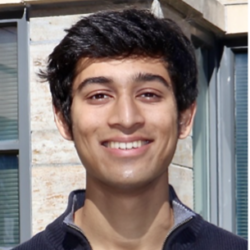


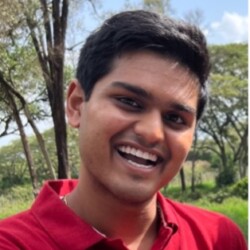
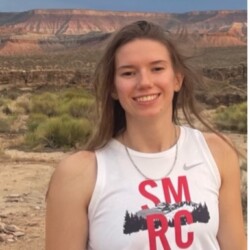
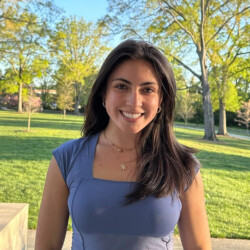
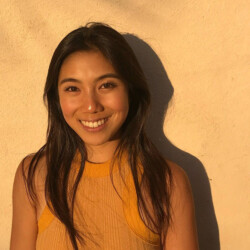
Creating something new with the tools of the old does not work. Our current systems are failing us — that is easy to see. But what might a new, better system look like?
Applications are now open for the 2023 Regenerative Futures Lab (rLab) sponsored by Kenan Institute for Ethics, Trinity College, and the Transformative Systems Project. Each semester, rLab will provide funding for several teams of students to search for paradigm shifting, regenerative answers to specific topical areas that will differ each year. The topical focus for the academic year 2023/24 is Debt — What We Owe to Each Other.
The Regenerative Futures Lab is a student-led research and action lab leveraging Duke’s resources to shift towards a regenerative economy. Students will work in teams of 5–6 to produce original results in the field of regenerative economics, policy, and activism. Both product and process of the students’ work will involve traditional and nontraditional pathways and final product components. The purpose of both product and process is to advance a regenerative future.
All teams will receive support from the director of rLab and the Kenan Institute, and will actively seek collaborations and input from experts in the field, faculty, and outside organizations. This process aims to generate non-extractive relationships between cohort members and the world around them as an essential part of breaking down exploitative constructs of work and community.
This lab is for students who sense that something is fundamentally wrong with the system in which we live — and that we study to become part of. Our aim is to empower such students to think beyond mainstream/dominant paradigms and towards a future that centers wellbeing, reciprocity, safety, and justice.
Application Deadline: August 31, 2023, midnight (there will be an additional application deadline for Spring 2024 applications)
Program Dates: September 5 – December 8, 2023; January 19 – April 24, 2024
Eligibility: Duke Undergraduate Students
Commitment/Expectation: All students will take part in a weekend workshop on regenerative economy hosted by the lab and explore possible subtopics before the lab meetings start. Students are expected to devote 6–8 hours a week to rLab. This time is split between lab/cohort meetings, independent research, and related events tied to the lab.
Award: One-time stipend of $1,200 per semester
Application Requirements:
- 100-200 words on (a) background (if applicable) in regenerative/transformative thinking and work; (b) specific interest/focus on a post-capitalist or post-growth or post-colonial or post-extractivist future
- 100-200 words in response to: “If I could wave a magic wand, what 2 or 3 major changes in the world would I propose?”
- 100-200 words on why you would like to join the lab
- A short essay on something you have done that you’re most proud of
- Indicate whether you have (1) taken a transformative course (such as wellbeing/care/feminist economics; post-colonial realities; indigenous narratives, etc); (2) been a member of TSP; (3) engaged in organizing or research efforts with a transformative systems groups and/or scholar (such as wellbeing or care econ, post-growth, BLM/Extinction Rebellion/Fridays for Future etc) – none of the above in any way represent requirements
Building a Happy City in rLab
Application Deadline: January 6, 2023
Creating something new with the tools of the old does not work. Our current systems are failing us—that is easy to see. But what might a new, better system look like?
Applications are now open for the 2022 Regenerative Futures Lab (rLab) sponsored by Kenan Institute for Ethics, Trinity College, and the Transformative Systems Project. Each semester, rLab will provide funding for several teams of students to search for paradigm shifting, regenerative answers to specific topical areas that will differ each year. The topical focus for the Spring semester of 2023 is Building a Happy City.
The Regenerative Futures Lab is a student-led research and action lab leveraging Duke’s resources to shift towards a regenerative economy. Students will work in teams of 4 to produce original results in the field of regenerative economics, policy, and activism. Both product and process of the students’ work will involve traditional and nontraditional pathways and final product components. The purpose of both product and process is to advance a regenerative future.
All teams will receive support from the director of rLab and the Kenan Institute, and will actively seek collaborations and input from experts in the field, faculty, and outside organizations. This process aims to generate non-extractive relationships between cohort members and the world around them as an essential part of breaking down exploitative constructs of work and community.
This lab is for students who sense that something is fundamentally wrong with the system in which we live—and that we study to become part of. Our aim is to empower such students to think beyond neoliberal paradigms and towards a future that centers wellbeing, reciprocity, safety, and justice.
Program Dates: January 22 – April 23, 2023
Eligibility: Duke Undergraduate Students
Commitment/Expectation:
All students will take part in a weekend workshop on regenerative economy hosted by the lab and explore possible subtopics before the lab meetings start. Students are expected to work 5-8 hours a week. This time is split between lab/cohort meetings, independent research, and related events tied to the lab.
Award: Students will be paid $16 per hour.
Application Requirements:
1. 100-200 words on (a) background (if applicable) in regenerative/transformative thinking and work; (b) specific interest/focus on a post-capitalist or post-growth or post-colonial or post-extractivist future
2. What unique perspectives or experiences do you bring to this work?
3. 100-200 words in response to: “If I could wave a magic wand, what 2 or 3 major changes in the world would I propose?”
4. 100-200 words on why you would like to join rLab
To apply, please fill out this Qualtrics form, which will prompt you to respond to the above questions, by midnight on Friday, January 6th, 2023.




